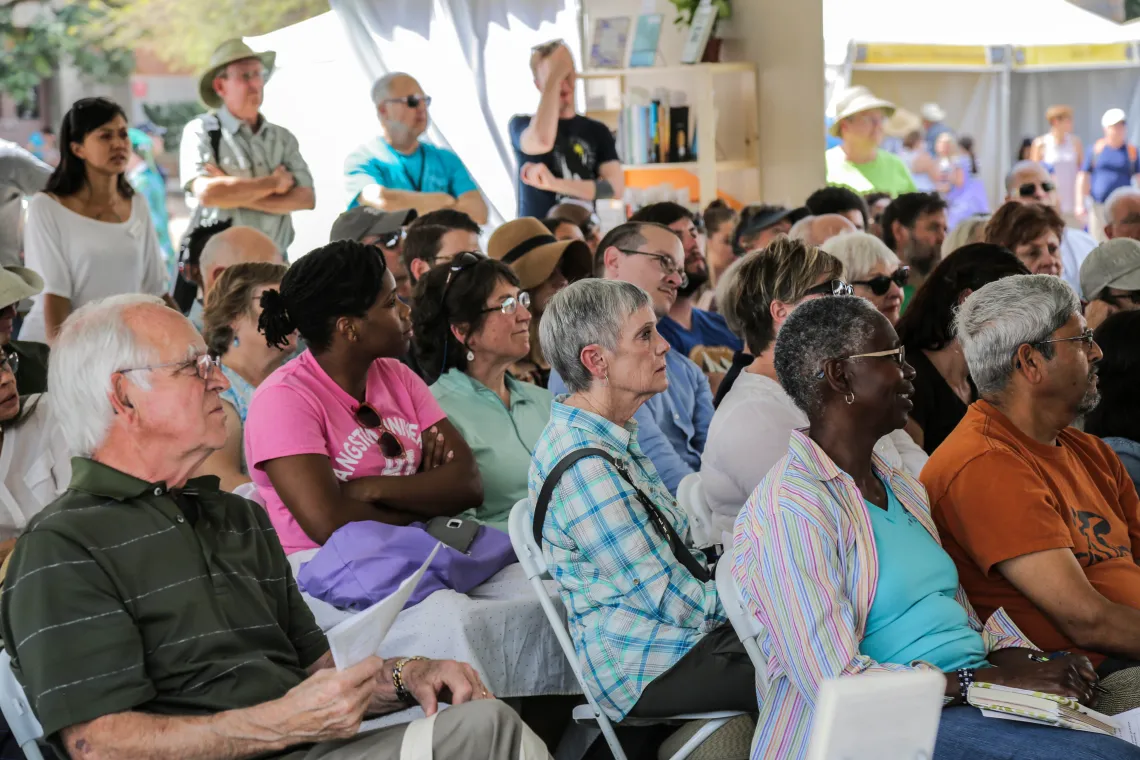Visit SBS Tent at the Festival of Books to Hear Topics Ranging from Global Warming to Tucson History

Come to the Social and Behavioral Sciences Tent (# 152) at the 2020 Tucson Festival of Books (March 14-15, 2020) to hear diverse voices discuss the critical issues of our time. Our sessions include:
- In-depth dialogue about our current economic system, Tucson history, U.S. diplomacy in the Middle East, and graffiti subculture
- unflinching examinations of sexual assaults, border crossings, and how race and class shape elections
- hopeful discussions of how to tackle hidden bias and reduce global warming
Experts include SBS faculty, MacArthur “genius” grant recipient Jennifer Eberhardt, and poet Staceyann Chinn. World-renowned UA linguist Noam Chomsky will also be a moderator at the festival. Check out our full schedule.
Programming at the Social and Behavioral Sciences Tent (#152)
Saturday, March 14
- 10 AM: In the session “Capitalism’s Last Hurrah,” one of the most cited public intellectual of our times, Noam Chomsky (Linguistics; Agnese Helms Haury Program in Environment and Social Justice), moderates a discussion with Marv Waterstone (Geography and Development) about the tribulations of our current economic system.
- 11:30 AM: In the session “What Can We Do About College Assaults?,” Columbia University researchers Jennifer Hirsch and Shamus Khan, authors of Sexual Citizens: A Landmark Study of Sex, Power, and Assault on Campus, join Elise Lopez (Consortium on Gender-Based Violence) to discuss the findings of a recent study on campus assaults.
- 1 PM: In the session “The Pain of Migration,” UArizona researchers discuss how the pain of border-crossings touches us all. The panel includes Linda Green (Anthropology); Robin Reineke (Southwest Center); and Rebecca Crocker (Public Health). The panel is moderated by Thomas Sheridan (Anthropology), the co-author of The Border and Its Bodies.
- 2:30 PM: Reducing global warming requires new and bold ways of living our lives. In the session “Climate Change, Culture Change,” Maxwell Boykoff, Alison Tickell, and Diana Liverman (Geography and Development) will explore ways culture and art can influence our response to this global crisis.
- 4 PM: In the session “How Race and Class Impact Elections,” Zoltan Hajnal, author of Dangerously Divided: How Race and Class Shape Winning and Losing in American Politics, and Barbara Norrander (Government and Public Policy) will explore how racial divides are impacting politics.
Sunday, March 15
- 10 AM: A volcanic eruption created Sentinel Peak a million years ago, and Tucson has been evolving ever since. What major breakthroughs in technology, social, and economic life have shaped Tucson? In the panel “Tucson: A Drama in Time,” author John Warnock (English) will discuss Tucson’s history with folklorist Maribel Alvarez (SBS Dean’s Office.)
- 11:30 AM: The declining influence of U.S. diplomacy in the Middle East began well before the current administration. In the session, “What Happened to U.S. Diplomacy?,” former diplomat David Dunford, author of From Sadat to Saddam: The Decline of American Diplomacy in the Middle East, and Anne Betteridge (Center for Middle Eastern Studies) will assess the atrophy of one of America’s most important tools for good in the world.
- 1 PM: In the panel “You Don’t Have to be Racist to be Biased,” Jennifer Eberhardt, author of Biased: Uncovering the Hidden Prejudice that Shapes What We See, Think, and Do, investigates how bias infiltrates our lives, and how it can be challenged and changed. Presented in collaboration with the James E. Rogers College of Law and moderated by Tammi Walker (Law).
- 2:30 PM: In his book Going All City: Struggle and Survival in LA’s Graffiti Subculture, Stefano Bloch (Geography and Development) offers a mesmerizing story of young graffiti taggers (or "writers”) in Los Angeles. In the session “Made You Look! How Graffiti Changed America,” Bloch, in conversation with Tucson street poet Logan Phillips (English), will help us re-think stereotypes of this subculture.
- 4 PM: Crossfire is the anticipated first poetry collection from Staceyann Chin, the proudly fierce Caribbean, Black, Asian, Lesbian, Woman, New Yorker who captivated audiences in Def Poetry. In the session, “A Recipe for Survival: Anger, Humor, Desire,” Chin will be interviewed by Stephanie Troutman (English).
Elsewhere at the Festival
SBS faculty can also be found at other venues during the TFOB weekend, including:
- Celeste González de Bustamante (Journalism) will moderate the session “Crisis at the Border.” (3/14, 10 AM)
- Aurelie Sheehan (English) will moderate the sessions “Meet Lisa See” (3/14, 11:30 AM) and “Short and Sweet” (3/15, 11:30 AM)
- Fenton Johnson (English) will be a panelist in “Live and Learn” (3/14, 1 PM) and “Hard Lessons from Hard Times” (3/15, 10 AM).
- Lydia Otero (Mexican American Studies) will be a panelist in the session “Rooted in Place” (3/14, 2:30 PM).
- Tom Miller (English) will moderate the panel “With Liberty and Justice for All?” (3/14, 4 PM)
- Kate Kenski (Communication) will moderate “Campaign 2020: What's New, Who's Who” (3/15, 10 AM)
- Ofelia Zepeda (Linguistics) will be a panelist in “Poetry for Who?” (3/15, 11:30 AM)
- Ander Monson (English) will discuss short stories and essays as a panelist in “Short and Sweet” (3/15, 11:30 AM)
We hope to see you at the Tucson Festival of Books!
History and Science! Interact with Our Units at the Festival!
Visit the Department of History’s booth (#117) and ask a historian about the stories behind your favorite books and check out their most recent publications.
Several of our units will have booths with activities in Science City. Learn about food preservation from ancient times to the present at the School of Anthropology booth (Science of Food); check out how robotics brings information, technology, and people together at the School of Information booth (Science of Tomorrow); and discover how language works at the Department of Linguistics booth (Science of You).

